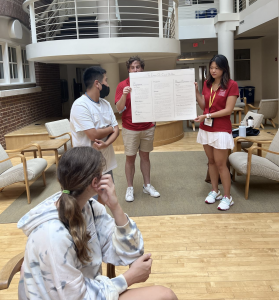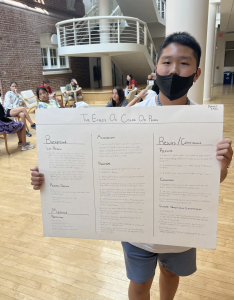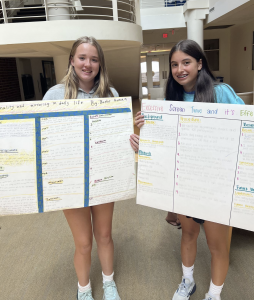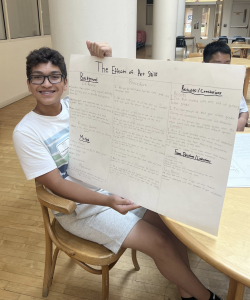Summer SAVY 2022/Session 6 – Psychology for Rising 7th/8th Grade
Posted by caughem on Monday, July 25, 2022 in blog, SAVY.
Friday: Hi everyone,
Happy last day! I wish I could tell you all about our awesome week together and fantastic final projects at an in-person Open House, but I will do my best to convey it all here!
Today we translated our research proposal templates (the ones I described earlier this week) into academic posters – identical to those presented at academic conferences in psychology. This required knowing how to prioritize and consolidate information; I modeled this for your students, and they did an excellent job generalizing the examples to their own posters.
Here are the parameters they were asked to follow.
———————————–
Final Project Description and Parameters:
Create a poster presentation of a research proposal that you develop about an original idea.
Include all the basic sections of a scientific poster:
1) Background (Literature Review, Research Questions, Hypotheses)
2) Methods (Participants, Measures, Procedure)
3) Results (All potential findings)
4) Conclusions (What conclusions could we make off of all these potential findings?)
5) Limitations/Future directions.
*Fill-out templates that I provide to you to make sure you cover all of these areas, and paste these documents onto your posters.
Communicate the specific area of psychology you chose to non-experts by presenting your poster to your classmates, and then your family members at the open house!
Successful final projects, in addition to fully completing all the sections above, will display high levels of creativity, critical thinking, and use clear (accessible) language.
———————————————————
Your students had the opportunity to practice the Communicate objective by presenting their posters in 5-10 minutes to the other SAVY class of 7th/8th graders. I also encouraged your students to present their posters to you when they get home. He are some questions I encourage you to ask them when they are presenting:
1) What was the most difficult part of developing a research proposal? Why?
2) Can you explain the scale between experimental control and ecological validity? Why do your measurements fall closer to one or the other?
3) How was your research question/study topic influenced by your interests? Why do you think you wanted to do a project on _____ topic?
I hope these conversations spur continued discussions around psychology and research in the real-world. Thank you again for the opportunity to teach your students this week!
Sincerely,
Nicolette
Thursday: Hi everyone,
We can hardly believe the week is coming to a close! Lots of sentimental feelings – this has become a very close group! It fills my heart with joy to see them choosing to spend their time as a whole group of 6 wherever we go (lunch, walking, breaks, etc.). I will miss them very much.
Today was “Career Day!” We took a break from content and our research proposals to engage in a different type of learning – learning through narratives! Your students heard from 5 speakers throughout the day. In the morning, they heard from a recent Vanderbilt psychology Ph.D. graduate who works on the user experience research team at Microsoft, and a current 3rd year Ph.D. student who researchers STEM cognition.
After lunch, your students heard from my advisor (Dr. Jonathan Lane) about what it’s like to work as a professor. Dr. Lane walked them through his personal journey to where is he is today from middle school on, even describing some hilarious undergraduate experiences collecting data from some sassy monkeys.
Finally, we wrapped up the day by hearing from another recent Vanderbilt psychology Ph.D. graduate who is the Lead Content Researcher at Lovevery, a toy company whose toys are designed by experts for the developing brain, and a current 5th year Ph.D. student who has done extensive amounts of research with advanced equipment such as eye-tracking.
Your students really seemed to enjoy our “career day.” They were engaged, asked many wonderful questions to our speakers, and exclaimed afterwards how “cool” they thought they all were.
Tomorrow, we wrap it all up with the completion of our final projects – the creation of our academic posters. I can’t wait to tell you more and for you to see them!
Sincerely,
Nicolette
Wednesday: Hi all!
Halfway through our week of growing and learning together! Today, as I told your students, was the “big work day.” The computer lab was our home in every sense of the word today (though we had lots of mini breaks out in the sunshine). Here in the computer lab your students completed all the templates that will compose their final projects/research proposals – six in all!!!:
1. Research Question Brainstorm template
2. Reading List template
3. Literature Review template
4. Methods template
5. Results/Discussion template
6. Limitations/Future directions template
Your students seem to really be appreciating this project, exclaiming how much they appreciate learning about psychology in such a hands-on and individualized way, with enough scaffolding (via the templates) to make them successful. I have been so proud of the work they have produced! Check-out their research topics below – can you guess which one is your student?
1. How does changing your personality affect the way you interact with other people, and how do you know your real personality when you change it so much for others?
2. How is running daily related to mental health?
3. What is effect of artistic skills on writing skills?
4. How does color affect the way that people focus/emotion/mood?
5. What is the effect of screen time on memory and learning?
6. How do different types of dreams affect mood?
We will be taking a nice little break from our final projects tomorrow to enjoy “career” day! Your students will spend the day hearing from and engaging with Vanderbilt psychology graduate students, professors, and industry professionals. Looking forward to telling you all about it tomorrow!
Tuesday: Hello Psychological Science Research Parents!
Day 2 & we had lots to do! Spirits and energy were high, and your students were excited to take on another day of being psychological research scientists. We began our day with our agenda, reminded ourselves of our class norms, and did a fun ice-breaker where your students were in groups and had to add on to the fictional story of the group before them – lots of laughs were had to start the day.
We then dove into some content. Today’s essential questions were:
-
- Is there such a thing as a “perfect” research study? Why or why not?
- What are some ways we can test research questions that are interesting to us?
- What do we weigh the strengths and limitations of different types of measurements when choosing?
- How does an idea become a research question?
Your students learned about the difference between ecological validity and experimental control, and were challenged to, in groups of 2, reason about where 7 different types of measurement fall along the spectrum between them. Your students really enjoyed this activity, describing it as “difficult, but so helpful”
Then came the big group project of the day – a real-life contract work assignment! Your students were placed in groups of 3 and given a unique problem to work through using the knowledge they acquired in the morning. Specifically, they needed to…
- Design a (basic) study to test the research question
- Put together a proposal/presentation explaining your decisions around measurement and the strengths/limitations of those decisions
- Present your proposal/presentation to the class – *everyone who is comfortable presenting/wants to needs to have an opportunity to say something
See Group 1 and Group 2’s problems below:
Group 1:
A group of local politicians has noticed a drastic increase in the amount of littering occurring around town. Despite their best effort to clean up the litter, it is still out of control. One politician suggested that perhaps it is the hotter temperatures that are causing an increase in littering, but they aren’t sure.
Do changes in the weather result in more or less littering?
Group 2:
A group of local politicians wants to know whether they should budget more money towards community classes to teach new parents the importance of reading to/with their children. One politician argues they should, saying that children whose parents read to them probably do better in school later on. But the other politicians aren’t sure that this is true, and argue that all kids will end up with the same reading education in their town schools, anyways.
Do parents that read to their children before formal schooling end up with kids that do better in school throughout life?
I was very impressed by how their proposals turned out! I also really enjoyed hearing your students provide respectful, constructive feedback to one another.
After lunch, students were given the guidelines for their final course project. We spent time outside responding to a critical journal prompt (they got to choose between 2) that would help them starting connecting their life experiences to interesting psychological questions, and shared responses with a classmate. Then, students worked independently to generate 5 potential research questions for their final project – a classmate later helped them narrow it down to the top 3. Finally, individual meetings with me solidified the final project ideas – what a fascinating group of questions we have! Students ended the day by brainstorming keywords to enter into Google Scholar, and entering those keywords to find three peer-reviewed, academic articles for their literature review.
We are all excited to be diving into such creative and personal projects, and ready for the hard work and fun tomorrow will bring!
Monday: Hello Psychological Science Research Parents!
What an amazing start to the week it has been! I feel extremely lucky to be spending the week co-constructing knowledge with your wonderful six students – we may be small, but this group of six brings enough insight and energy to match a room of 20:)
We started our day with introductions, my sharing of my teaching philosophy, and identifying themes around why your students were interested in this course, what they hope to get out of it, or what they are nervous for. My teaching philosophy is below:
“As a teacher, I value warmth, approachability, and transparency in dialogue with students, and patience, organization, and adaptability in co-constructing knowledge with students. Rather than valuing students leaving my class knowing how to “talk psychology” to other psychology students, I value students leaving knowing how to talk psychology to a friend or family member. That, to me, is the mark of true learning in this field.”
To make sure all your students get the opportunity to have their voices heard in this course, I use plenty of partner and small group work to host these discussions before we bring them to the big group. I learned that your students are eager to learn about psychology and pull-in observations and questions they have had as pre-teens/teenagers living in today’s world.
I introduced your students to different areas of psychology, and focused in on the three we are covering this week (Developmental, Social, Cognitive). We then began our first activity where your students watched clips of famous past psychology experiments in these three areas and practiced identifying 1) What sorts of questions did psychological scientists ask when designing this experiment? 2)What sorts of observations might have led to these questions? 3) How might the questions we ask today look the same or different?
After lunch, your students put these skills to the test with actual Vanderbilt Psychology graduate students! We went on a walking field trip where we toured Vanderbilt psychology labs and heard from two current graduate students about their research. Your students loved engaging with the stimuli and seeing where real research takes place. I challenged your students to write out a potential future research question for these graduate students after their presentations – your students stepped up to the challenge, and my colleagues are looking forward to thinking about the questions they posed:)
We ended our day with an activity that brought a cultural lens to our discussions. I showed your students carefully selected clips from the movie “Babies,” a documentary following 4 babies from Namibia, Japan, Mongola, and the U.S.. I asked your students to pretend they were researchers tagging along with the film production team, and to write down the observations that were most interesting to them. Your students excelled at turning these observations into research questions after they had practiced this skill all day. All of today’s practice will set them up for success as they get started on their big project tomorrow (details on that in tomorrow’s post!).
Thank you for reading! I look forward to another full day of learning together tomorrow:)



